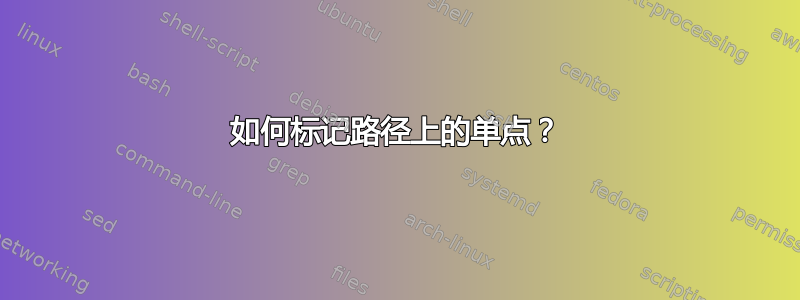
我想将线和点都包含在一条路径中。我的问题是该\draw命令不画笔触一个点,而只有一组坐标跟随该点。即\draw (0,0);没有产生可见效果。
代码:
\documentclass{standalone}
\usepackage{tikz}
\usepackage{xstring}
\usetikzlibrary{shadows}
\pgfkeys{
/glow settings/.is family,
/glow settings,
layers/.store in=\opacitysteps,
width/.store in=\glowwidth,
color/.store in=\linecolor,
default/.style={
layers=20,
width=6pt,
color=black
}
}
\newcommand\drawglow[2][]{%
\pgfkeys{/glow settings,default,#1}
\foreach \w in {1,...,\opacitysteps}{
\pgfmathparse{10/\opacitysteps*(1-pow(\w/\opacitysteps,0.25))}
\edef\layeropacity{\pgfmathresult}
\pgfmathparse{\glowwidth*\w/\opacitysteps}
\edef\layerwidth{\pgfmathresult}
\draw [opacity=\layeropacity,line width=\layerwidth,color=\linecolor] #2;
}
}
\begin{document}
\begin{tikzpicture}[line cap=round,line join=round]
\drawglow[width=15mm]{(0,0) -- (1,1) (2,2) (0,1) -- (1,0) (0,1.3) (2,2.1)}
\end{tikzpicture}
\end{document}
一开始我尝试去适应此解决方案获取字符串(0,0) -- (1,1) (2,2) -- ++(0,0) (0,1) -- (1,0) (0,1.3) -- ++(0,0) (2,2.3) -- ++(0,0),但没有成功。
我想获得以下结果:
编辑:我正在考虑 LaTeX 解决方案 - 而不是对每个对象进行单独调整。因此,相同的选项应该会修改路径和点的 stoking 样式。在我的问题中,传递给宏的参数具有统一的样式 - 点和线都是如此。所以让我们将它修复为(0,0) -- (1,1) (2,2) (0,1) -- (1,0) (0,1.3) (2,2.1)。我找到了一个类似问题,但实际上并未得到解答。
答案1
原始答案:circle[radius=.1pt]手动附加
在下面的例子中,单个坐标对应于前 n-1move-to路径操作在一连串连续的 nmove-to个圆(n >= 2)中,被逐个转换成小圆(<coordinate> circle[radius=.1pt])。
其他 power tikz 播放器可能会提供更先进、更自动化的解决方案,例如使用装饰和/或软路径操作spath3。
\documentclass{standalone}
%\documentclass{article}
\usepackage{tikz}
\usetikzlibrary{shadows}
\pgfkeys{
/glow settings/.is family,
/glow settings,
layers/.store in=\opacitysteps,
width/.store in=\glowwidth,
color/.store in=\linecolor,
default/.style={
layers=20,
width=6pt,
color=black
}
}
\newcommand\drawglow[2][]{%
\pgfkeys{/glow settings,default,#1}
\foreach \w in {1,...,\opacitysteps}{
\pgfmathparse{10/\opacitysteps*(1-pow(\w/\opacitysteps,0.25))}
\edef\layeropacity{\pgfmathresult}
\pgfmathparse{\glowwidth*\w/\opacitysteps}
\edef\layerwidth{\pgfmathresult}
\draw[opacity=\layeropacity,line width=\layerwidth,color=\linecolor] #2;
}
}
\begin{document}
\begin{tikzpicture}[line cap=round,line join=round]
\drawglow[width=15mm]{
(0,0) -- (1,1)
(2,2) circle[radius=.1pt]
(0,1) -- (1,0)
(0,1.3) circle[radius=.1pt]
(2,2.1) circle[radius=.1pt]
}
\end{tikzpicture}
\end{document}
更新、circle[radius=.1pt]自动插入
一些 tikz 内部被修补以允许在连续的 s 之间插入任意路径操作,包括 final和move-to之间的位置。move-to;
\documentclass{standalone}
\usepackage{tikz}
\usetikzlibrary{positioning, shadows}
\usepackage{xpatch}
\pgfkeys{
/glow settings/.is family,
/glow settings,
layers/.store in=\opacitysteps,
width/.store in=\glowwidth,
color/.store in=\linecolor,
default/.style={
layers=20,
width=6pt,
color=black
}
}
\newcommand\drawglow[2][]{%
\pgfkeys{/glow settings,default,#1}
\foreach \w in {1,...,\opacitysteps}{
\pgfmathsetmacro\layeropacity{10/\opacitysteps*(1-pow(\w/\opacitysteps,0.25))}
\pgfmathsetmacro\layerwidth{\glowwidth*\w/\opacitysteps}
% \pgfwarning{line width=\layerwidth}
\draw[opacity=\layeropacity,line width=\layerwidth,color=\linecolor] #2;
}
}
\makeatletter
\def\mytikz@text@moveto{moveto}
\xpatchcmd\tikz@handle
% relax the match pattern from `\tikz@resetexpandcount\pgfutil@next`
% to `\tikz@resetexpandcount`, to gain backward compatibility
{\tikz@resetexpandcount}
{%
\let\mytikz@pathop@last=\mytikz@pathop@current
\let\mytikz@pathop@current=\pgfutil@empty
% specially handle the case when the last path operation before ";" is moveto
\ifx\pgfutil@next\tikz@finish
\mytikz@drawcoord@prepare
{\let\pgfutil@next=\mytikz@drawcoord@drawfinish}%
\fi
\tikz@resetexpandcount
}
{}{\PatchFailed}
\xpatchcmd\tikz@moveto
{\tikz@scan@one@point{\tikz@@moveto}}
{%
\let\mytikz@pathop@current=\mytikz@text@moveto
\def\pgfutil@next{\tikz@scan@one@point{\tikz@@moveto}}%
\mytikz@drawcoord@prepare
{\let\pgfutil@next=\mytikz@drawcoord@drawbetween}%
\pgfutil@next
}
{}{\PatchFailed}
\def\mytikz@drawcoord@prepare#1{%
\ifx\mytikz@pathop@last\mytikz@text@moveto
\unless\ifx\mytikz@drawcoord@code\pgfutil@empty
#1%
\fi
\fi
}
\def\mytikz@drawcoord@drawbetween{%
\expandafter\tikz@scan@next@command\mytikz@drawcoord@code}
\def\mytikz@drawcoord@drawfinish{%
\expandafter\tikz@scan@next@command\mytikz@drawcoord@code;}
% user interface
\tikzset{
draw coordinate/.store in=\mytikz@drawcoord@code,
draw coordinate=% init to an empty value
}
\makeatother
\begin{document}
\begin{tikzpicture}[line cap=round,line join=round]
\drawglow[width=15mm]{
(0,0) -- (1,1)
(2,2)
(0,1) -- (1,0)
(0,1.3)
(2,2.1)
}
\node[below=of current bounding box] {before};
\end{tikzpicture}
\begin{tikzpicture}[line cap=round,line join=round]
\drawglow[width=15mm]{
(0,0) -- (1,1)
(2,2) circle[radius=.1pt]
(0,1) -- (1,0)
(0,1.3) circle[radius=.1pt]
(2,2.1) circle[radius=.1pt]
}
\node[below=of current bounding box] {manual solution};
\end{tikzpicture}
\begin{tikzpicture}[
line cap=round,
line join=round,
draw coordinate={circle[radius=.1pt]}
]
\drawglow[width=15mm]{
(0,0) -- (1,1)
(2,2)
(0,1) -- (1,0)
(0,1.3)
(2,2.1)
}
\node[below=of current bounding box] {auto solution};
\end{tikzpicture}
\end{document}





